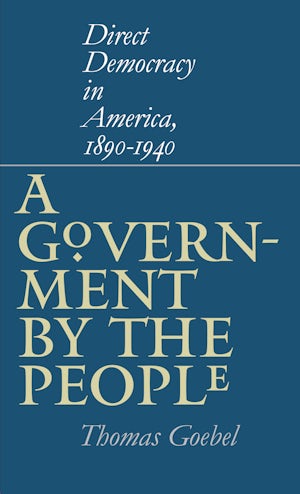A Government by the People
Direct Democracy in America, 1890-1940
By Thomas Goebel
320 pp., 5.25 x 8.5, notes, bibl., index
-
Paperback ISBN: 978-0-8078-5361-0
Published: May 2002 -
E-book EPUB ISBN: 978-0-8078-6018-2
Published: April 2003 -
E-book PDF ISBN: 979-8-8908-7363-7
Published: April 2003
Buy this Book
- Paperback $47.50
- E-Book $29.99
Frustrated with the governmental corruption and favoritism that facilitated the rise of monopolies, advocates of direct democracy aimed to check the influence of legislative bodies and directly empower the people to pass laws and abolish trusts. But direct democracy failed to achieve its promises: corporations and trusts continued to flourish, voter turnout rates did not increase, and interest groups grew stronger. By the 1930s, it was clear that direct democracy favored large organizations with the financial and organizational resources to fund increasingly expensive campaigns.
Recent years have witnessed a resurgence of direct democracy, particularly in California, where ballot questions and propositions have addressed such volatile issues as gay rights and affirmative action. In this context, Goebel's analysis of direct democracy's history, evolution, and ultimate unsuitability as a grassroots tool is particularly timely.
About the Author
Thomas Goebel is author of The Children of Athena: Professionals and the Creation of a Credentialed Social Order, 1870-1920. He was a research fellow at the German Historical Institute in Washington, D.C., from 1997 to 2002.
For more information about Thomas Goebel, visit
the
Author
Page.
Reviews
"Goebel successfully analyzes the larger political context of US politics in exploring the emergence of the institutional tools of direct democracy: the initiative, the referendum, and the recall. . . . Well-written."--Choice
"An insightful analysis of the origins and operation of the direct democracy movement."--Journal of American History
"An in-depth history of America's greatest civic reform movement from an economic perspective. . . . Worthy of further examination by historians and political scientists."--North Carolina Historical Review




